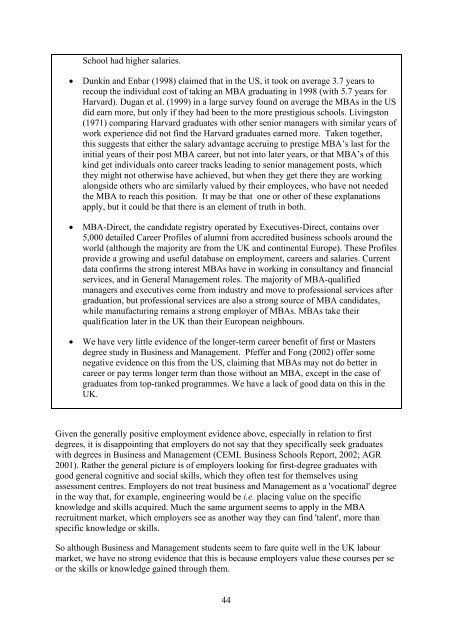The Development of Management and Leadership Capability and its ...
The Development of Management and Leadership Capability and its ...
The Development of Management and Leadership Capability and its ...
You also want an ePaper? Increase the reach of your titles
YUMPU automatically turns print PDFs into web optimized ePapers that Google loves.
School had higher salaries.<br />
• Dunkin <strong>and</strong> Enbar (1998) claimed that in the US, it took on average 3.7 years to<br />
recoup the individual cost <strong>of</strong> taking an MBA graduating in 1998 (with 5.7 years for<br />
Harvard). Dugan et al. (1999) in a large survey found on average the MBAs in the US<br />
did earn more, but only if they had been to the more prestigious schools. Livingston<br />
(1971) comparing Harvard graduates with other senior managers with similar years <strong>of</strong><br />
work experience did not find the Harvard graduates earned more. Taken together,<br />
this suggests that either the salary advantage accruing to prestige MBA’s last for the<br />
initial years <strong>of</strong> their post MBA career, but not into later years, or that MBA’s <strong>of</strong> this<br />
kind get individuals onto career tracks leading to senior management posts, which<br />
they might not otherwise have achieved, but when they get there they are working<br />
alongside others who are similarly valued by their employees, who have not needed<br />
the MBA to reach this position. It may be that one or other <strong>of</strong> these explanations<br />
apply, but it could be that there is an element <strong>of</strong> truth in both.<br />
• MBA-Direct, the c<strong>and</strong>idate registry operated by Executives-Direct, contains over<br />
5,000 detailed Career Pr<strong>of</strong>iles <strong>of</strong> alumni from accredited business schools around the<br />
world (although the majority are from the UK <strong>and</strong> continental Europe). <strong>The</strong>se Pr<strong>of</strong>iles<br />
provide a growing <strong>and</strong> useful database on employment, careers <strong>and</strong> salaries. Current<br />
data confirms the strong interest MBAs have in working in consultancy <strong>and</strong> financial<br />
services, <strong>and</strong> in General <strong>Management</strong> roles. <strong>The</strong> majority <strong>of</strong> MBA-qualified<br />
managers <strong>and</strong> executives come from industry <strong>and</strong> move to pr<strong>of</strong>essional services after<br />
graduation, but pr<strong>of</strong>essional services are also a strong source <strong>of</strong> MBA c<strong>and</strong>idates,<br />
while manufacturing remains a strong employer <strong>of</strong> MBAs. MBAs take their<br />
qualification later in the UK than their European neighbours.<br />
• We have very little evidence <strong>of</strong> the longer-term career benefit <strong>of</strong> first or Masters<br />
degree study in Business <strong>and</strong> <strong>Management</strong>. Pfeffer <strong>and</strong> Fong (2002) <strong>of</strong>fer some<br />
negative evidence on this from the US, claiming that MBAs may not do better in<br />
career or pay terms longer term than those without an MBA, except in the case <strong>of</strong><br />
graduates from top-ranked programmes. We have a lack <strong>of</strong> good data on this in the<br />
UK.<br />
Given the generally positive employment evidence above, especially in relation to first<br />
degrees, it is disappointing that employers do not say that they specifically seek graduates<br />
with degrees in Business <strong>and</strong> <strong>Management</strong> (CEML Business Schools Report, 2002; AGR<br />
2001). Rather the general picture is <strong>of</strong> employers looking for first-degree graduates with<br />
good general cognitive <strong>and</strong> social skills, which they <strong>of</strong>ten test for themselves using<br />
assessment centres. Employers do not treat business <strong>and</strong> <strong>Management</strong> as a 'vocational' degree<br />
in the way that, for example, engineering would be i.e. placing value on the specific<br />
knowledge <strong>and</strong> skills acquired. Much the same argument seems to apply in the MBA<br />
recruitment market, which employers see as another way they can find 'talent', more than<br />
specific knowledge or skills.<br />
So although Business <strong>and</strong> <strong>Management</strong> students seem to fare quite well in the UK labour<br />
market, we have no strong evidence that this is because employers value these courses per se<br />
or the skills or knowledge gained through them.<br />
44
















